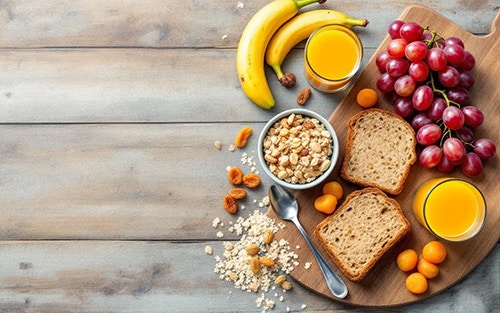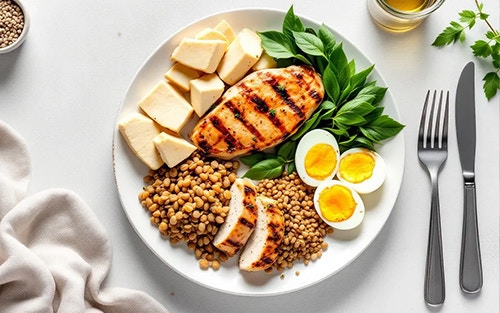Proper nutrition when running fuels your body, boosts performance, and aids recovery. This yourfootpalace.com article covers essential pre-run, mid-run, and post-run nutrition tips to help you make the most of every run.

Key Takeaways
- Carbohydrates are essential for runners, serving as the primary fuel source, and should be consumed adequately through snacks and carb loading for optimal performance.
- Protein plays a crucial role in muscle recovery after a run, and runners should spread their protein intake throughout the day to enhance endurance performance.
- Proper hydration, a balanced diet rich in vitamins, minerals, and healthy fats, and avoidance of common nutritional pitfalls are key to maintaining energy levels and overall health for runners.
The Role of Carbohydrates in Running
Carbohydrates are the powerhouse of a runner’s diet, acting as the primary fuel source during high-intensity and endurance activities. When we talk about nutrition for runners, carbohydrates take center stage. They are stored in the body as glycogen in the liver and muscles, ready to be converted into energy when needed during a run.
Distance runners, particularly those training for marathons or long-distance events, need to consume more carbohydrates. The body stores carbs as glycogen, which is utilized during endurance exercises to maintain energy levels and running performance. Inadequate carbohydrate intake risks depleting glycogen stores, leading to fatigue and decreased performance. Combining proper carbohydrate intake with a well-structured marathon training program can help runners optimize endurance and overall performance.
Pre-Run Carbohydrate Intake
Eating carbohydrates before running provides immediate energy. Simple carbohydrates, such as fruits and energy gels, are recommended for this purpose, as the body quickly absorbs them. A carbohydrate-rich snack 45 to 60 minutes before running can optimize energy levels and performance.

Examples of effective pre-run snacks include an energy bar, a banana, or a piece of toast with honey. These simple carbs, paired with a small amount of protein, can help sustain energy levels during the run. A pre-run snack, like a peanut butter and banana sandwich or a smoothie with protein powder, can provide the necessary fuel without causing digestive discomfort.
Carb Loading for Longer Runs
Long-distance runners benefit from carb loading to maximize glycogen stores. This practice involves significantly increasing carbohydrate intake 36 to 48 hours before an endurance event, allowing the body to store more energy for prolonged performance.
Effective carb loading can be achieved through meals rich in complex carbohydrates such as pasta, rice, and whole grains, paired with lean protein and healthy fats. This combination not only helps to fuel properly but also supports muscle recovery and sustained energy during the race.
Slow-releasing carbs and protein are particularly beneficial for ultra-distance runs.
Protein’s Importance in a Runner’s Diet
Protein in a runner’s diet supports muscle repair and recovery after intense training sessions. Runners are recommended to consume between 1 and 2 grams of protein per kilogram of body weight to meet their recovery needs. Consuming the proper amount of protein helps repair the stress and damage muscles endure during running.
Endurance athletes, including a marathon runner, benefit from a diet rich in lean protein sources such as:
- chicken breast
- fish
- tofu
- legumes
Adequate protein intake enhances endurance performance by promoting efficient recovery and muscle growth.

Post-Run Protein for Recovery
Post-run protein consumption supports muscle recovery and repair. Chicken, beef, tofu, and edamame are ideal as they contain essential amino acids for muscle repair. A post-run meal should ideally combine complex carbohydrates and protein, such as a peanut butter and banana sandwich or a smoothie with protein powder.
Greek yogurt with fruits or grilled chicken with roasted vegetables are excellent post-run options that provide a high-quality protein source to aid in recovery. These meals help mitigate muscle breakdown and replenish glycogen stores, preparing you for the next training session.
Balancing Protein Throughout the Day
Evenly distributing protein intake throughout the day enhances muscle health and maintains energy levels. Runners should aim to consume 15 to 30 grams of protein within an hour after finishing a workout for optimal recovery.
Incorporating protein-rich foods at every meal helps sustain muscle synthesis and recovery. For instance:
- Start the day with a protein-packed breakfast like eggs or Greek yogurt.
- Have lean protein like chicken or fish for lunch.
- Include a protein source, such as beans or tofu, at dinner.
This approach can make a substantial difference in overall performance and recovery.
Healthy Fats for Sustained Energy

Healthy fats provide concentrated energy and support overall health for runners. Unsaturated fats are found in:
- Olive oil
- Avocados
- Nuts
These fats are beneficial for heart health and reducing inflammation. They help maintain:
- Energy levels
- Nutrient absorption
- Hormone production
…all of which are crucial for optimal performance.
Incorporating healthy fats like fatty fish, nuts, and seeds into your diet can help sustain energy during long runs and aid recovery. Avoid high-fat foods before a run to prevent gastrointestinal discomfort and sluggishness.
Incorporating Healthy Fats
Integrate healthy fats by using olive oil for cooking, adding nuts to salads, or incorporating avocado in sandwiches. These foods not only enhance satiety but also provide essential fatty acids that support overall well-being.
It’s recommended to include healthy fats in moderate amounts, aiming for about 20 to 35 percent of daily caloric intake from fats. This balance allows room for necessary carbohydrates and proteins, creating a well-rounded, nutritious diet.
Hydration Strategies for Runners

Proper hydration is crucial, as even mild dehydration can affect performance and increase fatigue. Maintaining hydration involves water and electrolytes to prevent dehydration during runs. Sports drinks and electrolyte drinks can help replenish sodium and potassium lost through sweating, which is vital for muscle function and preventing cramps.
Tailor hydration strategies to individual needs, accounting for factors such as sweat rate and run duration. Regular fluid intake throughout the day and during running helps maintain energy levels, endurance, and recovery.
Hydrating Before, During, and After Runs
Drink 17-20 fl. oz. of water about two hours before a run for optimal hydration. Focus on regular hydration throughout the day rather than a large amount right before running.
During the run, consuming 5-10 fl. oz. of water every 15-20 minutes can help maintain hydration. Post-run, rehydrate as soon as possible, ideally drinking 16-24 fl. oz. of water for each pound lost to restore fluid balance.
Essential Vitamins and Minerals for Runners
Vitamins and minerals support the immune system and overall health, particularly for endurance athletes. Iron maintains hemoglobin levels, affecting oxygen supply to muscles and enhancing performance. Lean meats, beans, and spinach boost iron intake in a runner’s diet.
Combining iron-rich foods with vitamin C enhances iron absorption. A variety of fruits and vegetables provide vitamins, minerals, and antioxidants to support recovery and reduce inflammation.
Preventing Micronutrient Deficiencies
Addressing micronutrient deficiencies is crucial for maintaining optimal performance and health. Key vitamins and minerals for runners include iron for oxygen transport, vitamin D for bone health, and antioxidants for recovery and reducing inflammation.
A varied diet rich in fruits, vegetables, whole grains, lean proteins, and healthy fats ensures adequate nutrient intake. This balanced approach helps prevent common deficiencies and supports overall health and performance.
Avoiding Common Nutritional Pitfalls
Under-eating during the first half of the day often leads to sugar cravings and overeating later. Recognize the energy demands of running and consume enough calories to meet those needs. Fad diets that severely restrict calories or cut out entire food groups can negatively impact performance.
Avoid these pitfalls by focusing on:
- A balanced diet of carbohydrates, proteins, and fats.
- Using a food journal to track eating habits and identify areas for improvement.
- Proper nutrition to maintain energy levels and support overall performance.
Foods to Avoid Before Running
Certain foods can negatively impact performance and should be avoided before running:
- Foods high in fiber, such as beans and certain vegetables, can cause digestive discomfort during a run.
- Greasy and heavy meals can cause sluggishness and gastrointestinal distress.
- Spicy foods may also trigger stomach issues and are best avoided before running.
Choose lighter, easily digestible sources that provide quick energy without discomfort.
Creating a Balanced Runner’s Diet
Creating a balanced runner’s diet involves understanding ideal macronutrient distribution. Aim for a diet where 60% to 70% of calories come from carbohydrates, with lean proteins and healthy fats each contributing 15% to 20%. Carbohydrates are essential for providing the energy needed for running and preventing fatigue during training.

A food journal can track how different foods impact performance and guide dietary adjustments. This practice helps fine-tune the diet to meet energy needs and support training goals.
Sample Meal Plans
A nutritious full meal includes lean protein, whole grains, fruits, and vegetables to ensure adequate energy and nutrient intake. For breakfast, consider oatmeal topped with fruits and nuts or a smoothie with spinach, banana, and protein powder. Lunch could be a quinoa salad with grilled chicken and mixed vegetables, while dinner might include brown rice with salmon and steamed broccoli.
Snacks maintain energy levels throughout the day. Pre-run snacks like a banana or an energy bar provide a quick energy boost. Post-run snacks like Greek yogurt with berries or a peanut butter and banana sandwich aid in recovery and replenish glycogen stores.
Fueling During Long Runs
Fueling during long runs helps maintain energy levels and prevent fatigue. Energy gels, chews, and drinks are ideal mid-run fuels, providing easy-to-digest carbohydrates for sustained energy. These options replenish glycogen stores and energy stores, which typically last 60-90 minutes of moderate effort.
Many runners neglect to practice race-day nutrition, which is crucial for preventing stomach issues and maintaining energy. Incorporate mid-run fuel into training to accustom the body to digesting these nutrients, enhancing overall performance.
Practicing Mid-Run Nutrition
Experimenting with different mid-run fuels during training helps identify what works best for digestive comfort and energy needs. Training runs are an opportunity to test products like energy gels, energy drinks, chews, or fruit snacks to determine which suits your body and helps you maintain your pace.
Timing nutrition is crucial; fueling within the first 30 to 45 minutes of a long run helps prevent energy depletion. Take energy gels gradually over a few minutes for better absorption rather than all at once. This helps maintain steady energy levels and minimizes digestive issues.
Listening to Your Body

Identifying which foods optimize energy levels and performance requires listening to your human body. Nutritional requirements vary based on personal factors such as body type and training intensity. Understanding how foods and their timing impact performance allows for necessary dietary adjustments.
Consulting a nutritionist can help tailor dietary plans to ensure adequate intake of vitamins and minerals for optimal health. Paying attention to body signals and seeking professional advice enhances performance and recovery.
Nutrition When Running Summary
In summary, proper nutrition is the cornerstone of effective running performance. Carbohydrates, proteins, and healthy fats all play vital roles in providing energy, supporting recovery, and maintaining overall health. Hydration and the intake of essential vitamins and minerals further enhance your endurance and performance. Avoiding common nutritional pitfalls and practicing mid-run fueling strategies can make a significant difference in your running experience.
As you continue your running journey, remember to listen to your body and adjust your diet based on your needs. The right nutrition plan can transform your runs, helping you achieve your goals and enjoy every step of the way. Embrace the power of proper nutrition and unlock your full potential as a runner.
Running Nutrition Frequently Asked Questions
Why are carbohydrates important for runners?
Carbohydrates are crucial for runners as they serve as the primary fuel source, stored as glycogen in muscles and the liver, ensuring sustained energy during endurance activities. Adequate carbohydrate intake is essential for maintaining optimal performance in long runs.
What should I eat before a run?
Eating simple carbohydrates, such as fruit or an energy bar, 45 to 60 minutes before a run can provide you with immediate energy, especially when paired with a small amount of protein to support sustained performance.
How can I incorporate healthy fats into my diet?
Incorporating healthy fats into your diet can be easily achieved by using olive oil for cooking, adding nuts to salads, and including avocado in sandwiches. Aim for 20 to 35 percent of your daily caloric intake from these beneficial fats.
What are some good post-run recovery foods?
Grilled chicken with roasted vegetables, Greek yogurt with fruits, or a peanut butter and banana sandwich are excellent post-run recovery foods, providing high-quality protein and essential nutrients to aid muscle recovery. Choose these options to effectively replenish your body after a run.
How important is hydration during a run?
Hydration is essential during a run to maintain performance and prevent fatigue. Ensure you drink water and electrolyte drinks before, during, and after your run to replenish lost fluids and minerals.
(706) 521-5290